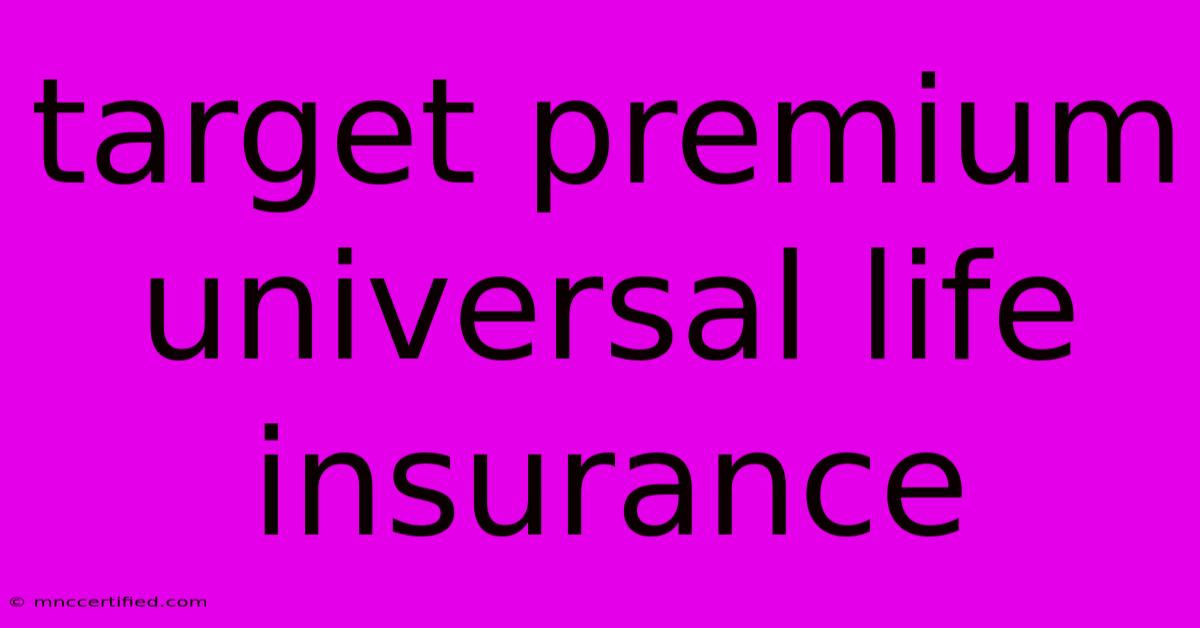Target Premium Universal Life Insurance

Table of Contents
Target Premium Universal Life Insurance: A Comprehensive Guide
Target Premium Universal Life insurance (TUL) is a type of permanent life insurance that allows you to customize your premium payments and death benefit to meet your specific needs. It's a powerful tool for individuals looking for flexible coverage and potential wealth-building opportunities, but understanding its intricacies is crucial. This comprehensive guide will delve into the ins and outs of Target Premium Universal Life insurance, helping you determine if it's the right fit for you.
What is Target Premium Universal Life Insurance?
TUL combines the death benefit protection of traditional whole life insurance with the flexibility of universal life insurance. Here's what makes it unique:
- Target Premium: Instead of fixed premiums, you set a "target" premium that you aim to pay each month. This allows for greater flexibility in your budgeting and potential for more premium payments.
- Cash Value Accumulation: Like other universal life policies, TUL builds cash value that grows over time, often through investment options. This cash value can be borrowed against for various needs, such as college tuition or home renovations.
- Flexibility in Death Benefit: You can adjust your death benefit to align with your changing life circumstances. This can be particularly beneficial as your family's needs evolve over time.
Key Features and Benefits of Target Premium Universal Life Insurance
Here are some of the key features and benefits of TUL:
- Flexibility and Customization: You control your premium payments and death benefit adjustments, allowing for personalized coverage.
- Potential for Wealth Accumulation: The cash value component can grow tax-deferred, potentially offering long-term financial benefits.
- Tax Advantages: Death benefits are typically tax-free, while withdrawals from the cash value may be subject to taxes and penalties.
- Long-Term Coverage: As a permanent life insurance policy, TUL provides lifetime coverage, ensuring your loved ones are financially protected regardless of your lifespan.
How Target Premium Universal Life Insurance Works
Here's a simplified breakdown of how TUL functions:
- Setting the Target Premium: You determine the desired target premium based on your financial situation and coverage needs.
- Premium Payments: You aim to pay your target premium each month. However, you have the flexibility to adjust the payment amount based on your circumstances.
- Cash Value Accumulation: A portion of your premiums goes towards building cash value, which is invested in a variety of options, such as mutual funds or fixed accounts.
- Death Benefit: The death benefit is the amount your beneficiaries will receive upon your passing.
Who Should Consider Target Premium Universal Life Insurance?
TUL can be a suitable option for individuals who:
- Seek Flexibility and Control: Those who prefer to tailor their insurance coverage to their evolving needs.
- Desire Potential Wealth Accumulation: Individuals seeking long-term investment opportunities within their insurance policy.
- Value Tax Advantages: Those looking to benefit from tax-deferred growth and tax-free death benefits.
Considerations Before Purchasing TUL
Before committing to a TUL policy, it's important to:
- Understand the Costs: TUL can involve higher premiums and fees compared to other types of life insurance.
- Review Investment Options: Carefully evaluate the investment options available and their potential risks and returns.
- Consult with a Financial Advisor: Seek professional guidance to determine if TUL aligns with your financial goals and risk tolerance.
Target Premium Universal Life Insurance: A Tailored Approach to Life Insurance
Target Premium Universal Life insurance offers a blend of flexibility, investment potential, and long-term coverage. By understanding its intricacies and carefully considering your financial situation, you can determine whether TUL is the right choice for your unique needs. Remember, seeking professional advice from a qualified financial advisor is crucial to making informed decisions regarding life insurance and wealth planning.

Thank you for visiting our website wich cover about Target Premium Universal Life Insurance. We hope the information provided has been useful to you. Feel free to contact us if you have any questions or need further assistance. See you next time and dont miss to bookmark.
Featured Posts
-
Europa League Man United Vs Paok Match Report
Nov 08, 2024
-
Lazard Investment Banking Analyst Salary
Nov 08, 2024
-
Can Gyno Surgery Be Covered By Insurance
Nov 08, 2024
-
Galatasaray Vs Tottenham Live Stream Time 11 6 24
Nov 08, 2024
-
Attorney Opinion Letter Title Insurance
Nov 08, 2024